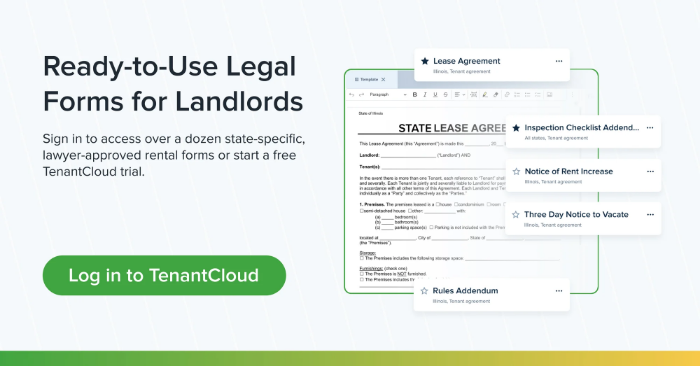If you’re a residential landlord or work in commercial property management in Alabama, you’ll know that it’s a role with a lot of responsibilities. You’ve got to work hard to ensure that the properties you manage are well-kept and habitable—and it really can be a full-time job. Among these responsibilities, there is one that is often the most challenging: removing a tenant. If you're running into an eviction situation with your property, make sure you understand the Alabama eviction laws.

At TenantCloud, we understand that the whole process can be quite daunting, but it doesn’t have to be overly stressful. The key lies in knowing the specific laws that relate to the task in Alabama, and we aim to help you with that here as we explore what you need to know as we head into 2025.
For What Reasons Can You Legally Serve an Alabama Eviction Notice?
So, let’s start at the beginning. What are the legal reasons you might want to evict tenants in Alabama? Well, under Alabama law, landlords can legally begin the process by serving an eviction notice when certain situations occur. Subsequently, if one of your tenants decides not to vacate the property after proper notice, the next step is the filing of an “unlawful detainer”.
The most common reasons for doing so include:
- Not Paying Rent - By far the biggest reason why landlords need to begin eviction proceedings is the non-payment of due rent. (In Alabama, this involves providing a 7-day notice)
- Violating Lease Terms - There are also occasions when tenants break the terms of their lease by keeping pets they’re not supposed to, engaging in illegal activity or damaging the property. (In this case, a 14-day notice will be required)
- The End of a Month-to-Month Tenancy - when tenants are on a lease without fixed terms (i.e. a one-month rolling lease) you can end the agreement with a 30-day written notice, on the proviso that there are no retaliatory or discriminatory motives behind the action.
- Holdover Tenancy - sometimes tenants remain in a rental property after the agreed term without renewing - known as a holdover tenancy. (In this case, a 30-day notice is required)
Pro Tip: Supporting documentation that details lease agreements and all communication is essential for landlords during an eviction process. Additionally, an Alabama eviction notice must be delivered in writing - either via certified mail or in person.
Related: Georgia Evictions | Laws and Protections
What Happens Next? The Tenant’s Response/Court Proceedings
So, what happens after you’ve filed your eviction lawsuit in Alabama? Naturally, in the interest of fairness, your tenant is given an opportunity to respond to your notice and also defend themselves in court. This is a crucial point for both sides, as a judge will take a look at all the evidence and then provide a ruling on the case.
The Tenant’s Response
After being given an Alabama eviction notice, tenants have seven days to respond to the court in writing*. *Keep reading to see reasons why an appeal might be made.
The Court Hearing
Should your tenant file a response, the court will then schedule a hearing during which both sides can put their case forward. The landlord gets to present evidence such as sent emails or property damage photos while the tenant can counter with their own proof, such as payment receipts.
Pro Tip: Whether you’re a tenant or a landlord, you should always be present at any eviction hearing and bring supporting documentation with you.
The Court’s Judgment and Writ of Possession
The judge in your eviction case will have a decision to make based on the evidence presented by each side. As such, a ruling will be made for either the landlord or the tenant.
Decision #1 - A Judgment in Favor of the Landlord
The first possibility is that the judge for your unlawful detainer case rules in your favor, which will result in you being issued with a writ of possession - meaning you have a legal right to reclaim your property. You may also be awarded expenses to cover your court costs, damages, and unpaid rent.
Decision #2 - A Judgment in Favor of the Tenant
The other potential outcome is that there’s a ruling in favor of your tenant. If this happens, the case will be dismissed and your tenant will be able to remain in the property. Also, they may be awarded compensation - should the eviction be deemed to be discriminatory or retaliatory (this is explained in more detail below).
Pro Tip: Never try and reclaim your property without a writ of possession, as this is illegal in Alabama and may result in fines or legal prosecution.
Related: North Carolina Eviction Laws 2024: Rights, Processes, and Compliance
When Might a Tenant Appeal an Alabama Eviction Notice?
So, in what instances might a tenant decide to appeal an eviction notice? Under Alabama eviction laws, there are several circumstances in which this might ensue.
- A Retaliatory Eviction - A major reason why a tenant in Alabama might appeal their eviction is if they feel like it’s because you served notice due to them simply exercising their legal rights e.g. if you decided to evict them just for filing a code violation relating to unsafe living conditions.
- Improper Notice - Another reason your tenant could appeal is if you didn’t provide the appropriate notice period. Alabama eviction laws state that landlords must provide notice periods in line with the reasons for the eviction e.g. it should be 7 days for non-payment of rent or lease violations.
- Discrimination - using religion, race, gender, familial status or nationality as a reason for evicting tenants is outlawed in Alabama (and the wider USA). If the tenant feels they have been discriminated against, and can prove it, this could cause the judge to rule in their favor.
Pro Tip: When serving an eviction notice, it’s vital that you check you’re doing so in alignment with Alabama law. For instance, when issuing a 7-day notice for non-payment of rent, it should clearly show the notice period and specify why it has been served. Paying attention to correct notice formatting and delivery is essential, as doing otherwise gives the tenant an easy way to challenge the eviction.
What Can You Do to Avoid Evictions in Alabama?
Evictions represent something of a last resort for landlords, and they often lead to stress, hurt feelings and wasted time. The good news, however, there are numerous measures you can implement in property management that will mean you’re much less likely to ever have to serve an Alabama eviction notice.
#1 - Properly Screen Your Tenants
Doing your due diligence on any potential tenant can save you from all sorts of issues later on. As such, if you properly screen applicants in terms of their backgrounds, previous evictions and credit history, the chances of lease violations, rent defaults and subsequent evictions can be reduced dramatically.
#2 - Maintain the Property
Many tenant/landlord disputes occur due to issues relating to the condition of rental properties. Whether talking about broken plumbing or pest infestation, if problems like these are dealt with quickly and with very little fuss, you reduce the chances of a) non-payment of rent, b) an eviction appeal and c) your relationship with the tenant breaking down.
#3 - Keep Clear Lines of Communication Open
In any relationship, communication is key to maintaining it, and that certainly applies in property management. As such, if you’re open and in regular contact with your tenants, you’re much better placed to deal with issues early and nip them in the bud. For instance, if a tenant is late paying their rent, you might want to reach out and explore alternatives to the eviction process, such as a payment plan.
#4 - Negotiate Through Mediation
Another way to avoid having to serve an eviction notice to your tenants is to consider mediation services to see if an agreement can be negotiated. This approach can save you a lot of time and money while ensuring that you remain on good terms with your tenants.
#5 - Document Every Development
Whatever your reasons for entering into the Alabama eviction process as a landlord, it’s super important that everything is documented, as otherwise, the judge may throw out your case. If the eviction reaches the court stage, you’ll need detailed records of lease agreements, when rent was/wasn’t paid and the notices that were served. Without it, your attempts to reclaim your property could be derailed.
Pro Tip: Periodically review your lease agreements and try to learn Alabama landlord rules by heart so that you can deal with potential problems before they escalate.
Related: Florida Eviction Laws 2024 Explained: Key Steps for Landlords & Tenants
FAQs About Alabama Landlord Tenant Laws
Many people ask questions online about eviction proceedings in Alabama. What does it involve, how does it work, etc. So many, in fact, that it’s tough to answer them all in a single article. That’s why we created this section to answer the most popular questions.
Q - What is the eviction timeline in Alabama?
A - The eviction process in Alabama typically takes 2–4 weeks, depending on whether the tenant contests the case and the court’s schedule.
Q - How much does it cost to file an eviction in Alabama?
A - Filing fees range from $100 to $200, depending on the county. Additional costs may include service fees for delivering court documents and potential attorney fees.
Q - Can landlords charge late fees during the eviction process?
A - Yes, but late fees must be outlined in the lease agreement and comply with Alabama law, which states that they must be reasonable.
Q - What happens if a tenant leaves before the eviction concludes?
A - Landlords must still follow Alabama’s abandoned property laws, which include storing belongings for 14 days and notifying tenants before disposal or sale.
TenantCloud - Simplifying Life for Landlords in 2025
There’s no getting around it—evicting a tenant is never easy, but it can happen, regardless of how professional and diligent you are as a landlord. However, as we’ve covered, there is much you can do to make life easier for yourself by being proactive, communicating well, and documenting everything. Needless to say, living up to your end of the bargain and keeping the property well-maintained is also going to help you avoid having to start the eviction process.
TenantCloud is another platform that can simplify your life as a landlord. It offers a wide array of useful features designed with property managers in mind. From maintenance tracking to hassle-free online tenant screening and automated rent collection, our software takes much of the legwork out of a wide range of landlord tasks and responsibilities.
So, if you like the sound of simplified, stress-free property management, you should take a look around our website to find out more about how TenantCloud’s tools can revolutionize your rental management. Try a free trial or contact us for a demo today.



